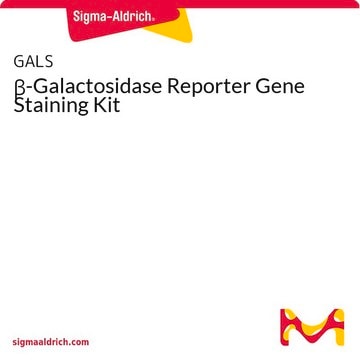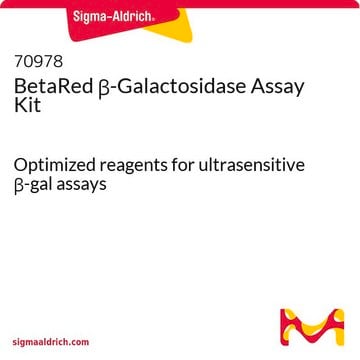おすすめの製品
使用法
sufficient for 250 assays (tubes)
sufficient for 500 assays (microplate)
メーカー/製品名
Roche
保管温度
2-8°C
詳細
The β-Gal Reporter Gene Assay is designed for specifically measuring bacterial β-galactosidase activity. To achieve this, the enzyme reaction is conducted at a pH that is optimized for bacterial β-Gal, but allows no significant endogenous eukaryotic β-galactosidase activity. However, if very high endogenous β-galactosidase activity is found (e.g., with hepatic cells), heat treatment can be performed to ensure the specific determination of the amount of bacterial β-galactosidase that is encoded by the transfected plasmid.
アプリケーション
The β-Gal Reporter Gene Assay, chemiluminescent, is used to quantitatively measure β-Gal expression in eukaryotic cells that are transfected with a plasmid bearing the β-Gal-encoding lacZ reporter gene.
特徴および利点
- Sensitive: Chemiluminescence technology allows detection of approximately 20 fg β-galactosidase in cell extracts
- High dynamic measuring range: Linear range over four to five orders of magnitude
- Constant light emission: The assay produces a long-lasting light emission instead of a short-peak kinetic
- Safe: No radioactive isotopes are used
- Fast: Approximately 1.5 to 2.5 hours elapse from start to finish
- Convenient: Kit contains all reagents needed, including lysis buffer, protease inhibitors, and a positive control
包装
1 kit containing 7 components.
調製ノート
Storage conditions (working solution): Substrate Reagent (solution 1) is stable at least for 24 h at 2 to 8 °C.
Initation Reagent (solution 2) is stable for at least 4 weeks when stored at 2 to 8 °C.
Lysis Reagent, 1x (solution 3) Lysis reagent without protease inhibitors is stable at
-15 to -25 °C or for 3 months at 2 to 8 °C. Lysis reagent containing protease inhibitors is stable for one week when stored frozen at -15 to -25 °C.
Positive Control (solution 4) The reconstituted enzyme solution is stable for 1 week at 2 to 8 °C. When stored frozen in aliquots at -15 to -25 °C the enzyme is stable for 3 months. Avoid multiple freezing and thawing.
Initation Reagent (solution 2) is stable for at least 4 weeks when stored at 2 to 8 °C.
Lysis Reagent, 1x (solution 3) Lysis reagent without protease inhibitors is stable at
-15 to -25 °C or for 3 months at 2 to 8 °C. Lysis reagent containing protease inhibitors is stable for one week when stored frozen at -15 to -25 °C.
Positive Control (solution 4) The reconstituted enzyme solution is stable for 1 week at 2 to 8 °C. When stored frozen in aliquots at -15 to -25 °C the enzyme is stable for 3 months. Avoid multiple freezing and thawing.
その他情報
For life science research only. Not for use in diagnostic procedures.
キットの構成要素のみ
製品番号
詳細
- β-Gal Substrate, Galacton Plus 100x concentrated
- Assay Buffer
- Enhancer
- Initiation Solution
- Protease Inhibitors
- Lysis Buffer 5x concentrated
- Positive Control, β-galactosidase (E. coli), lyophilizate
関連製品
製品番号
詳細
価格
シグナルワード
Danger
危険有害性の分類
Aquatic Chronic 3 - Eye Dam. 1 - Flam. Liq. 2 - Met. Corr. 1 - Skin Corr. 1B - Skin Sens. 1 - STOT SE 3
ターゲットの組織
Central nervous system
保管分類コード
3 - Flammable liquids
WGK
WGK 2
試験成績書(COA)
製品のロット番号・バッチ番号を入力して、試験成績書(COA) を検索できます。ロット番号・バッチ番号は、製品ラベルに「Lot」または「Batch」に続いて記載されています。
Molecular Analysis of the HOXA2-Dependent Degradation of RCHY1
Bridoux L, et al.
PLoS ONE (2015)
Alexandra Tauzin et al.
Journal of virology, 95(15), e0231120-e0231120 (2021-05-14)
Type I interferons (IFNs) are a family of cytokines that represent a first line of defense against virus infections. The 12 different IFN-α subtypes share a receptor on target cells and trigger similar signaling cascades. Several studies have collectively shown
HOXA2 activity regulation by cytoplasmic relocation, protein stabilization
and post-translational modification
and post-translational modification
Deneyer, et al.
Biochimica et Biophysica Acta (BBA)-Proteins and Proteomics (2019)
The O-GlcNAc transferase OGT interacts with and post-translationally modifies the transcription factor HOXA1
Draime et al.
Febs Letters (2018)
Arnaud Taminiau et al.
Nucleic acids research, 44(15), 7331-7349 (2016-07-07)
HOX proteins define a family of key transcription factors regulating animal embryogenesis. HOX genes have also been linked to oncogenesis and HOXA1 has been described to be active in several cancers, including breast cancer. Through a proteome-wide interaction screening, we
ライフサイエンス、有機合成、材料科学、クロマトグラフィー、分析など、あらゆる分野の研究に経験のあるメンバーがおります。.
製品に関するお問い合わせはこちら(テクニカルサービス)









